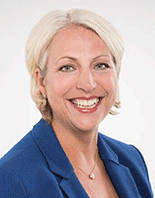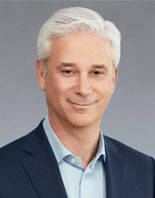
While continuing efforts to dispel regulatory clouds lingering from the sales-practices scandal that came to light in 2016, Wells Fargo & Co. has adopted a risk management structure that places chief risk officers in key lines of business, each of them reporting to the corporate CRO, Amanda G. Norton.
San Francisco-based Wells Fargo announced the new framework in May, along with the first two members of the expanded risk leadership team: Consumer Lending CRO Kevin Reen, formerly of JPMorgan Chase & Co. Card Services; and chief operational risk officer Bill Juliano, who was consumer and business banking CRO and U.S. chief operational risk officer at Santander Bank.

“This enhanced organizational structure will strengthen our risk management program, provide greater consistency in how we manage risk across our businesses, and better position us for the future,” Norton said at that time. “We have made - and continue to make - transformative changes to our risk management structure and practices, including important work to provide greater oversight of all risk-taking activities and a more comprehensive view of risk across the company.”
More shoes dropped on August 13 with the naming of six more executives reporting to Norton, four with CRO titles as well as a new chief compliance officer, Paula Dominick, who was most recently CCO of Credit Suisse USA and previously worked at Bank of America, Goldman Sachs and Morgan Stanley. Dominick will join Wells in October and succeed Mike Roemer, CCO since January 2018 after serving as Barclays' group head of compliance in London.
Other C-Suite Changes
Charles W. Scharf, the former Bank of New York Mellon Corp. chairman and CEO who became Wells' president and CEO in October 2019, and his senior team are effecting other C-suite changes. In July, for example, Mike Santomassimo from BNY Mellon was tapped to succeed John Shrewsberry, a 22-year Wells veteran, as chief financial officer. In London, Lola Ninonuevo was named chief operating officer, and Richard Place chief financial officer, for the EMEA region.
Also in July, Wells reported a net loss of $2.4 billion for the second quarter, accounting for an $8.4 billion increase in the credit loss reserve due to economic conditions.
“While the negative impact of the pandemic is unprecedented and many of our business drivers were negatively impacted, our franchise should perform better, and we will make changes to improve our performance regardless of the operating environment,” Scharf stated.
The $1.97 trillion-in-assets banking company is operating under Federal Reserve-imposed growth restrictions that were relaxed in April to allow for more business lending.
Coordination and Oversight
"Mandy” Norton, a senior executive vice president, whose past affiliations over three decades in financial services include JPMorgan Chase and Bank of America, was appointed CRO in May 2018 under Timothy Sloan, then Wells' president and CEO. Her predecessor, Michael Loughlin, who retired, was among the C-level officials who came under scrutiny in regulatory probes and other post-mortems on the scandal and the bank's risk governance.

In January 2020, Loughlin was assessed a $1.25 million civil money penalty by the Office of the Comptroller of the Currency. It was one of a series of such actions that went as high as $17.5 million for ex-chairman and CEO John Stumpf and $25 million for Carrie Tolstedt, head of the community bank, whose risk management was deemed insufficiently controlled at the corporate level. (The community bank's CRO, Claudia Russ Anderson, was penalized $5 million.)
Wells had long prized and reinforced the autonomy granted to its decentralized and profitable business units. Although the new corporate risk structure involves a distributed network of CROs, the company is stressing the “enhanced, centralized and independent” nature of what Norton has termed a “transformative” model. It “will strengthen our centralized, independent risk management program, provide greater consistency in how we manage risk across our businesses, and better position us for the future,” she said in her latest statement.
Wells further explained: “The new CROs will each provide independent, holistic risk leadership and oversight for their respective business lines and functional areas, creating streamlined interaction with independent risk management and a comprehensive view of risks across each of the businesses. The CROs will work in strong partnership with leaders who will continue to oversee market, credit, operational, compliance, strategic, and model risk holistically across the entire company.”
Clifford Rossi, professor of the practice and executive-in-residence, Robert H. Smith School of Business, University of Maryland, a longtime risk manager and observer of the profession, said Wells appears to be avoiding the perils of decentralization “largely because each CRO reports directly to the enterprise CRO.” Rossi noted that an internal report after the retail bank account-opening scandal “highlighted issues arising from the first-line risk officers, where they were not providing information to the second line and the second line was too deferential. This looks like tightening the risk reins a bit, which makes sense given what happened.”
[See Rossi's article for GARP Risk Intelligence, Risk Management Lessons from the Wells Fargo Report]
Additions to the Roster
In addition to CCO Paula Dominick, the new members of Norton's team are:
-
Brian King, who will join Wells Fargo as CRO for Consumer & Small Business Banking in October. He was most recently CRO and head of finance for Goldman Sachs' consumer business and was previously with JPMorgan Chase.
-
Ellen Koebler, who will be Wells' CRO for Commercial Banking, effective in September. Koebler has been deputy CRO at Truist and CRO of SunTrust Banks, and held leadership roles at E*Trade, JPMorgan Chase, First Union, and Shell Oil & Shell Chemical Companies.
-
Prasanna Someshwar, CRO for Wealth & Investment Management, starting in October. Someshwar was previously at JPMorgan Chase in positions including CRO and chief credit officer for Wealth Management/Private Bank.
-
Jeff Colson, CRO for Finance as of September, after transitioning from head of capital management at Wells Fargo.
-
Patrick Dillon, Enterprise Testing & Validation leader, effective immediately. He joined Wells Fargo's risk organization in 2018 and was previously in compliance leadership roles at PNC Financial Services and Bank of America Merchant Services. Wells said Dillon “will lead the team responsible for the development and design of methodologies and standards for review activities across the company and provide strategic leadership of significant enterprise-wide testing programs.”
A search remains underway for a CRO for Corporate & Investment Banking.